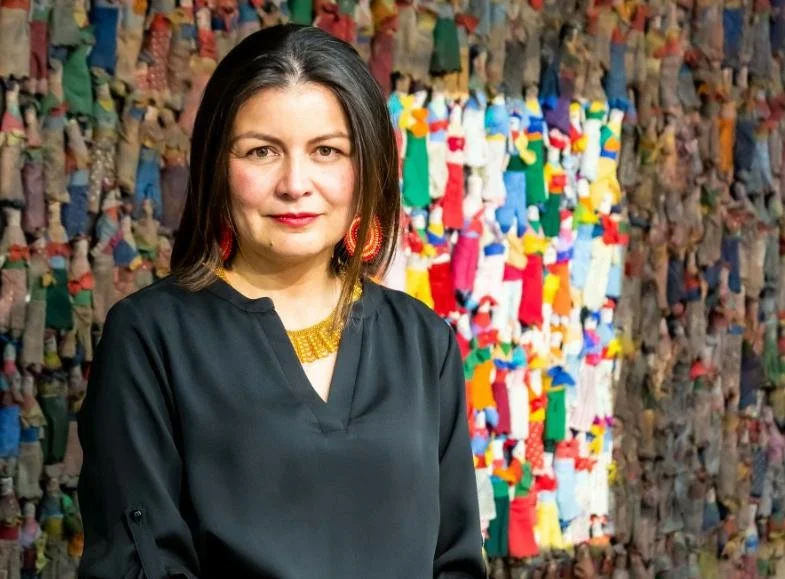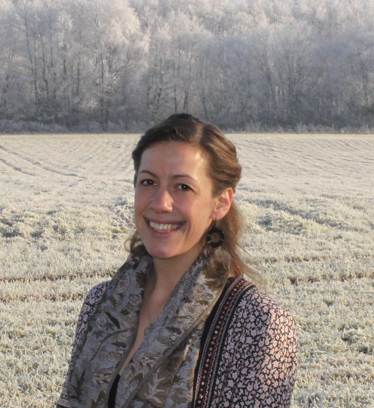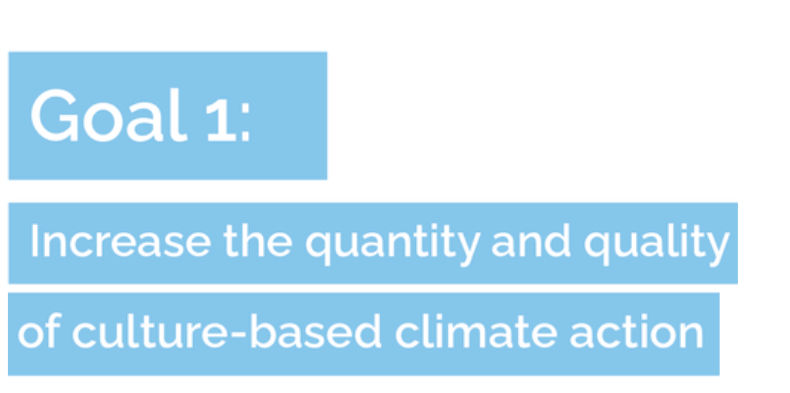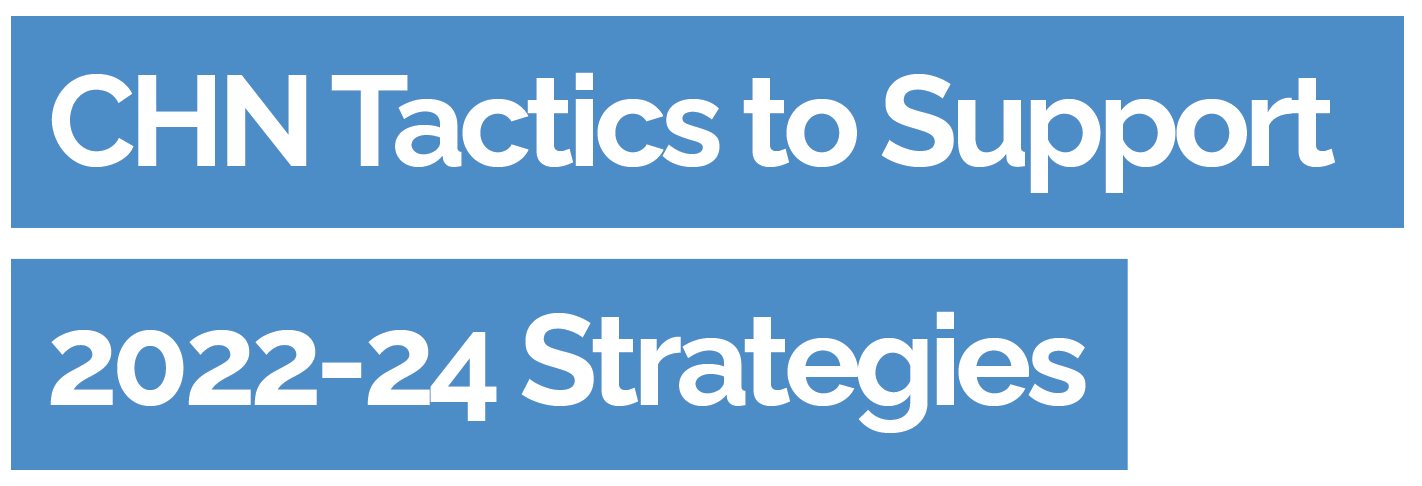
Empowering People to Imagine and Realise Climate Resilient Futures Through Culture – from Arts to Heritage
The Climate Heritage Network
2022-24 Action Plan
“We commit to strengthening efforts to address climate change and support communities in achieving the decarbonization goals and other ambitions of the Paris Agreement, emphasizing that arts, culture and heritage (including sites and landscapes, institutions and collections as well as creativity, intangible heritage, traditional ways of knowing and practices) constitute an invaluable resource to help communities reduce GhG emissions and strengthen adaptive capacity, even while the risks to those resources from climate impacts must also be addressed.”
Action Plan Implementation Leadership
Executive Summary
This Action Plan is based on a Theory of Change which posits that culture – from arts to heritage – enables transformative climate action by empowering people to imagine and realise low-carbon, just, climate resilient futures. It builds on earlier work by trailblazing culture colleagues to help people and communities adapt to the changes in climate that humans have already caused and to mitigate future climate change by accelerate the far-reaching transitions needed to hold global warming to 1.5°C.
Despite much good work, contemporary climate planning has suffered from a pervasive failure to imagine desirable ways of living not wedded to the carbon economy and the systems that support it. Culture- and heritage-based approaches can fill this gap, although given the transversal nature of culture, multiple strategies are needed.
Culture-based climate response includes addressing both those elements of culture that can help solve the climate crisis and those that have helped cause it. On the one hand, historical and socio-economic forces like colonialism and globalism have spread ‘petrocultures’ and ‘carbonscapes’ across the earth. The heritage of the Anthropocene. On the other hand, traditional knowledge, buildings, and landscapes that pre-date the fossil fuel era can point the way to post-carbon living. The worldviews held by Indigenous Peoples and local communities never co-opted by modern take-make-waste approaches offer counterpoints to unsustainable paradigms of ‘progress.’ Artistic, creative, and imagintive tools support transformative reinterpretation of inherited mindsets.
This Action Plan is designed to shape change by connecting Climate Heritage Network members to each other and partners across sectors in order to re-orient climate policy, planning, and action at all levels to better take account of these cultural dimensions.
This Action Plan is being taken forward by the members of the Climate Heritage Network, which include arts, culture and heritage institutions, organisations, authorities, and businesses at all levels and whose members, staffs, and affiliates embrace diverse Cultural Voices, among them archaeologists, architects, landscape architects, administrators, archivists, artists, crafts persons, conservators, curators, engineers, geographers, historians, librarians, musicians, museum professionals, performers, site mangers, urban planners, and writers, as well as activists, scientists, researchers, teachers, scholars, and carriers of local and Indigenous knowledge.
The Plan prioritises support for rights-based, place-based, demand-side, and people-centred strategies for safeguarding and championing those elements of art, culture and heritage that point the way to circular, regenerative ways of living not dependent on exploiting people and nature, and for challenging and interpreting those elements that have helped cause the climate emergency. It seeks to strengthen frameworks in which cultural actors and operators work as accomplices with Indigenous Peoples and local communities and build common cause with intersectional interests such as racial and gender equality, linking culture to climate justice in ways that bolster climate action and climate resilient sustainable development.
In support of these aims, this Action Plan establishes two goals for calendar years 2022-24:
Increase the quantity and quality of culture-based climate action by CHN member organisations and other Cultural Voices at local, regional, national, and international scales and across sectors. To achieve this goal, the CHN will pursue three key strategies:
Develop ‘guiding values’ for culture-based climate action (that is, a set of suggested practices for designing and implementing culture-based climate action, e.g., that such projects be science-based, connected to broader climate efforts, and just and inclusive).
Develop and promote tools to help advocates more effectively use culture, from art to heritage, to empower people to imagine and realise low carbon, just, climate resilient futures, including promoting buildings reuse as climate action, the mainstreaming of culture into climate planning, and the role of culture in climate resilient sustainable development.
Design and launch the Culture Initiative of the Race to Resilience to deepen understanding and action on the cultural dimensions of resilience while supporting efforts to catalyse a step-change in global ambitions to build the resilience of four billion people by 2030.
Transform climate policy by using culture and heritage to embed in climate policymaking at all levels social imaginaries of low-carbon, just and fair, climate resilient living, while encouraging attention to climate justice, both to improve the efficacy of climate planning and action, and to support the work of local Cultural Voices. To achieve this goal, the CHN will pursue two key strategies:
Stimulate Engagement by Cultural Voices with Key International Climate Policy Issues. The CHN has selected twelve specific policy areas/processes with strong culture-climate synergies, including
Adaptation and Resilience; Article 6 Carbon Markets/Non-Market Response Measurers Issue; Buildings and Infrastructure; Climate Impacts; Education, Training and Public Awareness (ACE); Just Transition; Food and Agriculture; Loss and Damage, Migration, Displacement, and Human Mobility; Tourism; Waste and Consumption; Women and Gender; and Youth and Future Generations.
Stimulate Engagement by Cultural Voices at Key Climate Policy Forums. The CHN will encourage and support Cultural Voices to engage with key international policy events, including for example the World Urban Forum 11 (WUF11) and the UNESCO Conference on Cultural Policies and Sustainable Development (Mondiacult 2022).
Emphasis will be placed on COP27 and related processes (e.g., Africa Climate Week) to amplify arts, culture and heritage Voices in climate change policy making in Sharm el-Sheikh and across Egypt, in the MENA region and across the African continent, around the world, and online. This engagement will be designed to support and inspire climate action by Cultural Voices at all levels, in turn driving engagement by wider audiences and the public; build climate capacity within Cultural Voices; and growing the Climate Heritage Network in order to leave behind a post-COP27 legacy of more effective international collaboration, with a view towards COP28 in the United Arab Emirates and beyond.
To realise these goals, the CHN will work to enhance the functionality of its own networking platform and the benefits available to CHN member via the network, through enhanced regional structures; greater multilingualism with an initial focus on Francophone and Spanish/Portuguese activities; and more impactful communications strategies and assets.
Today, the world is dangerously off course to meeting the goals of the Paris Agreement. This Action Plan reflects a shared belief that we can and must do better and that Cultural Voices are one keys to delivering, with and for the next generation, a more resilient, sustainable, and just planet.

‘Culture and heritage are vitally important aspects of our lives and resources influencing how our communities and societies adapt to climate change’
– Dr Hoesung Lee, Chair, Intergovernmental Panel on Climate Change, at the International Co-Sponsored Meeting on Culture, Heritage and Climate Change launch event (December 2021)
Background
2022 marks the CHN’s third full year of operation. It was October 2019 when advocates from around the world came together in Edinburgh, UK in search of new ways to expand their impact at the intersection of culture and climate change. They established the CHN, not as a new organisation but as a true network, a voluntary coalition of diverse collaborators who believe that as culture-climate advocates, they are stronger together.
These collaborators include arts, culture and heritage institutions, organisations, authorities, and businesses at all levels. Their members, staffs, and affiliates include archaeologists, architects, landscape architects, administrators, archivists, artists, crafts persons, conservators, curators, engineers, geographers, historians, librarians, musicians, museum professionals, performers, site mangers, urban planners, and writers, as well as activists, scientists, researchers, teachers, scholars, and carriers of local and Indigenous knowledge. Firm in the conviction that climate is a core culture issue, and that culture is a core climate issue, the Members created the CHN so that these Culture Voices would have a place to connect, learn, exchange, and coordinate with each other.
A common concern was that the immense potential of culture from arts to heritage to drive climate action and support just transitions towards low carbon, climate-resilient futures was going untapped. The CHN’s first Action Plan was designed to help dismantle barriers to realising this potential. Released at the 2019 UN Climate Conference (COP25) in Madrid and dubbed the Madrid-to-Glasgow Arts, Culture & Heritage Climate Action Plan, it kicked off two years of culture-based climate action by six CHN Working Groups that culminated in November 2021 at COP26 in Glasgow. The Plan’s outputs have been collected in a new, online Climate Heritage Resource Library.
The motto of the 2019-21 Action Plan was ‘Mobilising Arts, Culture and Heritage for Climate Action.’ This reflected the consensus in 2019 that priority needed to be placed on awakening more culture colleagues to the imperatives of the climate crisis. While much work remains to be done, indicators show that more Cultural Voices than ever have now been galvanized for climate action. This progress, the CHN believes, is sufficient to warrant a change in focus.
The Climate Heritage Network’s new 2022-24 Action Plan builds on work already being done by trailblazing colleagues to challenge and support an ever-widening number of Cultural Voices to place a focus on helping people and communities accelerate the far-reaching transitions needed to hold global warming to 1.5°C and to adapt to the changes in climate humans have already caused.

… the scarcity of social imaginaries capable of conceiving plausible forms of living without dependence on fossil fuels is not just a climate change problem. Rather, it is intimately tied to an “epistemological monoculture” that has impoverished the collective global capacity to imagine and realize forms of living not dependent upon exploitation of people and natural 'resources.'
- Stoddard, I., et al. (October 2021). Three Decades of Climate Mitigation: Why Haven't We Bent the Global Emissions Curve?. Annual Review of Environment and Resources
Theory of Change
Empowering People to Imagine and Realise Climate Resilient Futures Through Culture - from Arts to Heritage
Culture – from arts to heritage – enables transformative climate action by helping people to imagine and realise low-carbon, just, climate resilient futures. Unlocking that potential is the Theory of Change on which this Action Plan is based.
Across the world but particularly in industrialised societies, contemporary climate planning suffers from a pervasive failure to imagine desirable ways of living not wedded to the carbon economy and the systems that support it.ii Too often, it focuses on technological solutions to the exclusion of less-easy-to-quantify dimensions of the climate emergency. This failure perpetuates incremental approaches that are falling far short of the transformative change needed to hold global warming to 1.5C ° and avoid losses and damages to the planet, its peoples, and their cultures and heritage.
Culture- and heritage-based approaches can fill this gap, although given the transversal nature of culture, multiple strategies are needed. Culture-based climate response includes addressing both those elements of culture that can help solve the climate crisis and those that have helped cause it. On the one hand, historical and socio-economic forces like colonialism and globalism have spread 'petrocultures' and 'carbonscapes’ across the earth.iii The heritage of the Anthropocene. The ideologies of extraction and exploitation of both people and nature have resulted in enduring inequity and injustice with consequences for lives and livelihoods both past and present. Culture-based approaches offer entry points to these critical questions, which must be addressed to avoid further conflict and damage.
On the other hand, traditional knowledge, buildings, and landscapes that pre-date (or works independently of) the fossil fuel era can point the way to post-carbon living. The worldviews held by Indigenous Peoples and local communities never co-opted by modern take-make-waste approaches offer counterpoints to unsustainable paradigms of ‘progress.’ Artistic, creative, and imaginative tools support transformative reinterpretation of today’s carbonscapes and their accompanying mindsets. A new culture for the Novacene.
This Action Plan is designed to shape change by connecting Climate Heritage Network members to each other and partners across sectors to re-orient climate policy, planning, and action at all levels to better take account of these cultural dimensions.
The Plan prioritises support for rights-based, place-based, demand-side, and people-centred strategies for safeguarding and championing those elements of art, culture and heritage that point the way to circular, regenerative ways of living not dependent on exploiting people and nature, and for challenging and interpreting those elements that have helped cause the climate emergency. It seeks to strengthen frameworks in which cultural actors and operators work as accomplices with Indigenous Peoples and local communities and build common cause with intersectional interests such as racial and gender equality, linking culture to climate justice in ways that bolster climate action and climate responsive sustainable development.
Action Plan Goals
In support of these aims, this Action Plan establishes two goals for the Climate Heritage Network for calendar years 2022-24:
Increase Culture-Based Climate Action: To increase the quantity and quality of culture-based Climate Action at local, regional, national, and international scales and across sectors, emphasising the power of arts, culture and heritage to help people imagine and realise low-carbon, just and fair, climate resilient futures, especially through rights-based, place-based, demand-side, and people-centred action, and the need for approaches that distinguish between the elements of culture and heritage that are part of the cause of climate change versus those that are part of the response, and which undertake to challenge the former while championing the later.
Transform Climate Policy via Culture: To transform climate policy (including climate science policy) at all levels by using culture and heritage to embed in policymaking social imaginaries of low-carbon, just and fair, climate resilient living.
Goal 1 Strategies
The Members of the CHN will accomplish Goal 1 by:
Strategy: Developing ‘guiding values’ for culture-based climate action (that is, a set of practices for designing and implementing culture-based climate action this is just and inclusive, e.g., that such projects be science-based, connected to broader climate efforts). The work will seek to advance the CHN’s Theory of Change, including encouraging (1) adopting approaches for differentiating and respectfully sunsetting ‘complicit heritage’; (2) nourishing an art ecosystem that is locally rooted, non-extractive, and joined-up to climate action; and (3) strengthening the cultural rights perspective.v Final Guiding Values will be delivered by the end of 2023. A possible companion project is to launch a Climate Action training programme for cultural organisations/agencies (and/or a culture training programme for climate organisations/agencies).
Strategy: Developing and promoting tools to help CHN members more effectively use culture, from art to heritage, to empower people to imagine and realise low-carbon, climate resilient futures, especially through rights based, place-based, demand-side, and people-centred approaches. The CHN will focus on promoting the tools, resources and wisdom created by its Members and by others as appropriate, as well as developing or seeding the development of new tools where gaps exist.
Launch of Member Forum on the Online Member Platform to allow information exchange among CHN.
Madrid-to-Glasgow Action Plan and encouraging creation of follow-on tools, including:
Develop, promote, and popularize the practice of Building Recycling and Retrofit as a critical means to achieve required carbon reduction; embed the CARE tool in practice (CHN Working Group 3)
Phase 2 of Heritage in Climate Planning project (CHN Working Group 4)
Mainstreaming culture into the implementation of the 2030 SDG agenda via public Awareness (SDG 13 Target 13.3); promote lessons of the WG5/UCLG report on the role of culture in climate resilient sustainable development (CHN Working Group 5)
Launch of a CHN YouTube Channel and companion webpage to collect and organise online CHN-Related video resources including prior presentations and other resources.
Strategy: Design and launch Culture Initiative of the Race to Resilience (and parallel goals under MGPCA Resilience Pathway). The RTR aims to catalyse a step-change in global ambitions to build the resilience of four billion people by 2030. The CHN’s RTR Partner Initiative will support this goal by catalysing 200 cities and regions to offer culture-based strategies to help vulnerable groups and communities become more resilience to climate risks. Project will include articulation of an illustrative menu of culture-based resilience strategies; encouragement for adopting strategies; and metrics for measuring impacts. A focus on Locally Led Adaptation (LLA) and climate equity and justice will be paramount.

The Parties to the Paris Agreement … emphasize ‘the important role of indigenous peoples’ and local communities’ culture and knowledge in effective action on climate change, and urges Parties to actively involve indigenous peoples and local communities in designing and implementing climate action.
- COP26 Glasgow Climate Pact, Para 93 (2021)
In 2022-24, the Climate Heritage Network will work on behalf of and through its Members to transform international climate policy and science by using culture and heritage to embed into policy design social imaginaries of plausible forms of living without dependence on fossil fuels, both to improve the efficacy of climate planning and action, and to support local arts, cultural, and heritage voices by helping to deliver climate change policy and funding frameworks that valorise their work, while encouraging attention to climate justice in climate action as well as in arts and culture practice.
Goal 2 Strategies
The Members of the CHN will accomplish Goal 2 by:
Strategy: Stimulating Engagement by Cultural Voices with Key Climate Policy Issues. The CHN has selected eleven specific policy areas/processes in which to engage. One or more CHN Members have been selected to serve as Issue Leads. Issue leads are asked to take the knowledge and perspective of the culture sector and help the CHN contribute that to one or more specific climate policy processes. Issue lead duties include: (1) familiarising themselves with their issue/process, and (2) helping the CHN determine at least one concrete step to take in advance of COP27 and helping to guide the CHN in that step. Emphasis is placed on leveraging the connections and engagement made by CHN members in 2021, including via COP26. Attention will be paid to coordination with Working Groups and across issues.
Issue Areas and Policy Processes
Adaptation and Resilience
Mainstream culture into the new two-year Glasgow–Sharm el-Sheikh work programme on the global goal on adaptation (new global standards to help countries measure and track adaptation).
Mainstream culture into national adaptation communications being submitted in accordance with decision 9/CMA.1 ahead of COP27 to provide timely input to the global stocktake [follow up from G20].
Article 6 Carbon Markets/Non-Market Response Measurers Issue
Engage with the new Glasgow Committee on Non-market Approaches launched at COP26 (to promote culture-based opportunities for non-market-based cooperation to implement mitigation and adaptation actions in NDCs.)
Engaging in the Article 6 technical work plan under the UNFCCC’s SBSTA to finalize additional technical details before 2023 (to address cultural heritage and cultural rights safeguarding in climate finance – akin to EU Taxonomy or World Bank ESSs).
Buildings and Infrastructure
Participate in work of Global Alliance for Building and Construction (GlobalABC), including potential new historic rehabilitation category in the Construction21 awards. Work is parallel to engagement in the buildings elements of the Marrakech Partnership for Global Climate Action (MGPCA) Human Settlements Pathway and the COP27 Presidency SURGe Initiative - Sustainable Urban Resilience for the Next Generation.
Engage with Architecture2030 working together on shifting from a build-first mindset. Operationalizing Whole Life Carbon Accounting (WLCA) by linking operational carbon reductions to embodied carbon investments. Understanding true sustainability. We have the needed know-how and technology and must now focus on aligning policy and economics to support decarbonization.
Climate Impacts
Addressing climate change impacts on culture and cultural and natural heritage must be accelerated at all levels, with focus on better modelling, vulnerability assessment, and transfer to action including resilience building, disaster risk reduction and adaptation planning, and through a precautionary approach that delivers the emissions reduction needed to reach a 1.5-degree Celsius pathway.
Engage with Greek Government’s Climate Change Impacts on Cultural Heritage Initiative
Collaborate with the National Geographic Society and partners on promoting science-based, community-led, values-driven climate vulnerability assessments for heritage places.
Education, Training and Public Awareness
Engage with the new 10-year ‘Glasgow work programme on Action for Climate Empowerment’ adopted at COP26 regarding climate education, training, public awareness, public participation, public access to information and international cooperation on climate change.
Just Transition
Provide culture inputs to the Katowice Committee of Experts on the Impacts of the Implementation of Response Measures (referred to as the Katowice Committee on Impacts).
Food and Agriculture
Koronivia joint work on agriculture -- conclusions, as well as a ‘roadmap’ of what the Koronivia process will look like going forward. Key issue is to support inclusion of a reference to ‘agroecology.’ Build potential connection to GIAHAS.
Loss and Damage, Migration, Displacement, and Human Mobility
Engage with Warsaw Mechanism Expert Groups, especially expert group on non-economic losses and the task force on displacement.
Provide culture inputs into the new Glasgow Dialogue between Parties to discuss the arrangements for the funding of activities to avert, minimize and address loss and damage associated with the adverse impacts of climate change, with an emphasis on non-economic loss and damage.
Provide culture inputs to the Santiago network for averting, minimizing, and addressing loss and damage associated with the adverse effects of climate change.
Tourism
Engage with tourism stakeholders including the World Tourism Organization to emphasise sustainable tourism approaches that allow cultural destinations to generate positive economic and social benefits for local communities while reducing tourism’s carbon footprint.
Create synergies with relevant cultural tourism stakeholders such as the Organization of World Heritage Cities and the European Cultural Tourism Network.
Identify and promote good practices of lower-carbon itineraries, slow travel, and tourism as a ‘cultural and learning’ experience including via the Destination of Sustainable Cultural Tourism Awards 2022 and the European Heritage Awards / Europa Nostra Awards.
Waste and Consumption
Promote and implement new cultural heritage targets in the UN’s MGPCA Human Settlements Pathway on waste and consumption and the COP27 Presidency SURGe Initiative - Sustainable Urban Resilience for the Next Generation, including:
Identify heritage and culture organizations actively advancing waste reduction or circular economy through a heritage lens or with a heritage component to eventually form a workgroup/task force/other to advance integration of culture/heritage into circular economy policies and practice at a global scale. Engage with Ellen MacArthur Foundation.
Promote and contribute to updated revisions/international adaptation of Circular Heritage Toolkit.
Partnership with Architects Climate Action Network (UK) to partner on circular economy policy advancement.
Women and Gender
Incorporate cultural institutions and actors to ensure the further strengthening and continuance of the UNFCCC Gender Action Plan (GAP) to deliver successful gender-responsive policy and action in support of the implementation of the Paris Agreement, both internationally and at national levels
Youth
Join YOUNGO and participate in UN Climate Change Conference of Youth COY17 – the UNFCCC’s pre-COP27 youth event.
Building the CHN Youth Forum’s capacity and outreach
As much as possible, integrate young people and members of the CHN Youth Forum into other working groups/task teams
Create synergies with other Youth-oriented bodies and organisations (e.g., UNESCO Youth Forum, European Students’ Association for Cultural Heritage)
Ensure the representation of Youth and the CHN Youth Forum in relevant initiatives and events (COP27, Mondiacult, COY17, etc)
Focus on fostering intergenerational dialogues through either our own events or encouraging more young people to participate in activities where they have the opportunity to speak with people of other generations.
Strategy 2.2
Stimulate Engagement by Cultural Voices at Key Climate Policy Fora. The CHN will encourage and support cultural voices to engage with key international climate policy events. One or more CHN Members has been selected to stake the lead. Event Leads will focus on appropriate steps to contribute culture-based inputs to these processes. Emphasis is placed on leveraging the connections and engagement made by CHN members in 2021, including via COP26
Enhanced Regional structures
Regional meetings and representation at relevant UN regional climate weeks
New regional web pages
Regional discussion boards on Member Platform; Launch of periodic‘ Information online sessions’ where CHN Co-chairs can directly exchange withmembers of their constituencies
Multilingualism
Launch Francophone Group
Launch Spanish/Portuguese Group
CHN Communications Task Force
Develop a network of CHN Members’ comms personnel who could advise on overall Comms effort, including branding and messaging of other initiatives, and development of Comms assets for members. This task force will endeavour to coordinate all outputs with multilingualism representatives to ensure we are sharing our press releases, issue-related comms, and other work of the CHN in as many languages as is practicable.







































